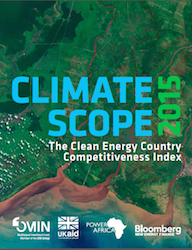According to the new report Climatescope, developing nations have surpassed the world’s wealthiest countries in securing more renewable energy investments. Climatescope is a clean energy country competitiveness index, interactive report and online tool supported by the U.S., U.K. and Inter-American Development Bank Group. The report unveils a portrait of clean energy activity in 55 emerging markets in Africa, Asia and Latin America  and the Caribbean. The group includes major developing nations China, India, Pakistan, Brazil, Chile, Mexico, Kenya, Tanzania and South Africa, as well as dozens of others. Energy solutions reviewed included solar, wind, small hydro, geothermal, biomass, and other zero-carbon emitting technologies (excluding large hydro).
and the Caribbean. The group includes major developing nations China, India, Pakistan, Brazil, Chile, Mexico, Kenya, Tanzania and South Africa, as well as dozens of others. Energy solutions reviewed included solar, wind, small hydro, geothermal, biomass, and other zero-carbon emitting technologies (excluding large hydro).
The news came shortly before a round of UN-organized climate negotiations kicked off in Paris prior to the start of COP21. Bloomberg New Energy Finance, which released the report, says these talks often focus on the question of how much capital wealthier countries should make available to lesser developed countries to address the climate challenge.
Climatescope’s key findings include:
- For the first time ever, over half of all new annual investment into clean energy power generating projects globally went toward projects in emerging markets, rather than toward wealthier countries.
- New investment in renewables soared in 2014 in the 55 Climatescope countries assessed to hit a record annual high of $126bn – up $35.5bn, or 39%, from 2013 levels.
- The results were substantially bolstered by the remarkable growth in China, which added 35GW of new renewable power generating capacity all on its own – more than the 2014 clean energy build in the US, UK, and France combined.
- Meanwhile, “South-South” investment (funds deployed in Climatescope nations from banks or other financial institutions based in those countries) surged to $79bn in 2014 from $53bn the year prior.
- Continuing declines in clean energy costs appear to be driving growth. Costs associated with solar photovoltaic power have ticked down 15% year-on-year globally. Solar is particularly competitive in emerging markets which often suffer from very high power prices from fossil generation while also enjoying very sunny conditions.
- A total of 50.4 gigawatts (GW) of new clean capacity was built in Climatescope countries, marking a 21% uptick from the prior year. In another first, renewables capacity deployed in emerging markets topped that in wealthier Organization for Economic Co-operation and Development (OECD) nations.
- On a percentage basis, clean energy capacity is growing twice as quickly in Climatescope nations compared to OECD ones.
The report found that progress was achieved during 2014 despite a number of countries in the survey seeing economic growth rates slow. Average gross domestic product growth across Climatescope nations slipped to 5.7 percent in 2014 from 6.4 percent in 2013 with the slow-down most apparent in major nations, Brazil, South Africa, and China. Despite the pullback, these three countries attracted a total of $103bn in new clean energy investment in 2014.

